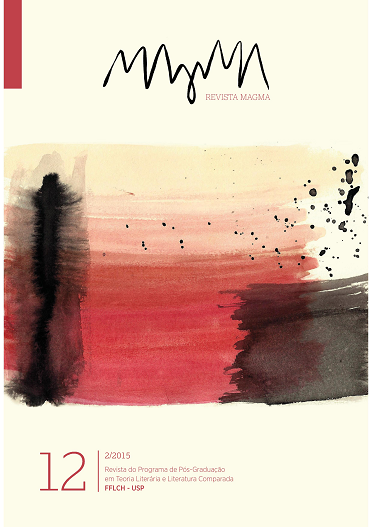Posições
DOI:
https://doi.org/10.11606/issn.2448-1769.mag.2015.97811Keywords:
Samuel Beckett, unword, psychoanalysis, prose, dramaAbstract
This article mobilizes certain subjects appertaining to Samuel Beckett’s oeuvre while attempting to map some of the aesthetic and political problems presented in his early work, specifically, in the text known as the “German Letter” of 1937, and that will remain as an undercurrent in his mature texts. The focus here will lie mainly on the book The Lost Ones. Thus, I sought to establish a relation between the coveted “unword literature” and the figure of “its lost one”. I consider this text to be the steppingstone for my M.A. research, and I therefore have allowed myself to ask questions that will later on be reviewed and developed uponDownloads
References
Andrade, Fábio de Souza. Samuel Beckett: o silêncio possível. São Paulo: Ateliê Editorial, 2001.
Baudelaire, Charles. Oeuvres Complètes. Paris: Bibliothèque de la Pléiade, 1961.
Beckett, Samuel. The Complete Dramatic Works. London: Faber and Faber, 1986.
______________ Nohow On. Londres: John Calder, 1989.
______________ Pour finir encore et autres foirades. Paris: Les Éditions de Minuit, 2004b.
______________ L’innomable. Paris: Les Éditions de Minuit, 2004.
______________ Fim de Partida. trad. Fábio de Souza Andrade. São Paulo: Cosac Naify, 2010.
______________ En attendant Godot. Paris: Les Éditions de Minuit, 2007
______________Esperando Godot. trad. Fábio de Souza Andrade. São Paulo: Cosac Naify, 2010.
_______________ Disjecta – Miscellaneous writings and a dramatic fragment. New York: Grove Press, 1984.
______________ Le Dépeupleur. Paris : Les Éditions de Minuit, 2007.
______________ O Despovoador. trad. Eloisa Araújo Ribeiro. São Paulo : Martins Fontes, 2008.
______________ Proust. trad. Arthur Nestrovski. São Paulo: Cosac Naify, 2003.
Brater, Enoch. Beyond Minimalism – Beckett’s late style in the theatre. Nova Iorque: Oxford University Press, 1987.
Cage, John. Silence. Middletown: Wesleyan University Press, 1973.
Cavarero, Adriana. Vozes Plurais – Filosofia da expressão vocal. Belo horizonte: Editora UFMG, 2011.
Didier-Weill, Alain. Les trois temps de la loi. Paris : Seuil, 1995.
Freud, Sigmund. História de uma neurose infantil : (“O homem dos lobos”): além do princípio do prazer e outros textos (1917-1920). trad. Paulo César Lima de Souza. São Paulo: Companhia das Letras, 2010.
_____________ Psicologia das massas e análise do eu e outros textos (1920-1923). trad. Paulo César Lima de Souza. São Paulo: Companhia das Letras, 2011.
Lacan, Jacques. Ecrits I. Paris: Editions du Seuil, 1966.
Locatelli, Carla. Unwording the World – Samuel Beckett’s prose works after the Nobel prize. Philadelphia: Univeristy of Pennsylvania Press, 1990.
Lacoue-Labarthe, Philippe. Musica Ficta. Paris: Christian Bourgois, 1991.
Lacoue-Labarthe, Philippe, Nancy, Jean-Luc. Le tittre de la lettre. Paris : Éditions Galilée, 1973.
Menezes, Philadelpho (org.). Poesia Sonora – Poéticas Experimentais da voz no século XX. São Paulo: Educ, 1992.
Nancy, Jean-Luc. A l’écoute. Paris: Galilée, 2002.
Poizat, Michel. Vox Populi, Vox Dei – voix et pouvoir. Paris : Editions Métailié, 2001.
Rancière, Jacques. Le partage du sensible. Paris: La Fabrique-éditions, 2000.
______________ Le spectateur émancipé. Paris : La Fabrique-éditions, 2008.
Sagayama, Mario. “Entrevista com Jacques Donguy”. In: Revista Cisma, vol. 1, 2012. Disponível em : http://www.revistas.fflch.usp.br/cisma/issue/view/58. Último acesso : 06/05/2015.
Vives, Jean-Michel. La voix sur le divan – musique sacrée, opéra, techno. Paris : Flammarion, 2012.
Zizek, Slavoj. Violence. London : Profile Books, 2008.
Downloads
Published
Issue
Section
License
Autores que publicam nesta revista concordam com os seguintes termos:
- Autores mantém os direitos autorais e concedem à revista o direito de primeira publicação, com o trabalho simultaneamente licenciado sob a Licença Creative Commons Attribution CC-BY-NC-ND que permite o compartilhamento do trabalho com reconhecimento da autoria e publicação inicial nesta revista.
- Autores têm autorização para assumir contratos adicionais separadamente, para distribuição não-exclusiva da versão do trabalho publicada nesta revista (ex.: publicar em repositório institucional ou como capítulo de livro), com reconhecimento de autoria e publicação inicial nesta revista.
- Autores têm permissão e são estimulados a publicar e distribuir seu trabalho online (ex.: em repositórios institucionais ou na sua página pessoal) a qualquer ponto antes ou durante o processo editorial, já que isso pode gerar alterações produtivas, bem como aumentar o impacto e a citação do trabalho publicado (Veja O Efeito do Acesso Livre).



